Abstract
The research article raises the problem of the quality of the organization of the educational process. In the system of Russian education, there has been a trend aimed at practical orientation, connection with the school and the scientific foundations of the organization and planning of the educational process. And in this link, according to the program of an internal independent assessment of the quality of education, monitoring was carried out at the Chechen State Pedagogical University. The aim of the study was to identify students' satisfaction with the educational process in order to develop practical recommendations and make managerial decisions. During the monitoring, a questionnaire method was used, consisting of 10 questions that were developed with the involvement of specialists from the Department of Philosophy, Political Science and Sociology, Psychology, the Center for the Development and Support of Talented Youth and the Department for Educational and Social Work. 1839 full-time students from 5 faculties and 2 institutes of the university were involved in the survey. According to the results of the study, the average quality satisfaction rate was 59 %, and issues that require special attention and elaboration in the further planning of the educational process. Based on the analysis of monitoring results, practical recommendations have been developed to improve the functioning of the educational process at the university and the quality of the educational process and management decision-making.
Keywords: Analysis, monitoring, process, questioning, quality, students
Introduction
The realities of today place high demands on the compliance of Russian education with world standards, therefore, improving the quality of education has become one of the important tasks of the pedagogical thought of society (Bagadirova et al., 2016; Hunter et al., 2006; Izmailova, 2015). As stated in the Concept of teacher training for the education system for the period up to 2030, “The content, technologies, management and infrastructure of teacher education require constant transformation associated with the changes taking place in the general education system, with the need to ensure the outstripping pace of changes in the teacher training system” (Howie & Plomp, 2005; Leimu et al., 1998).
Problem Statement
The resulting component and outcome of the functioning of the general education system is quality. The system of internal independent assessment of the quality of education in the university is underestimated and requires scientific justification, search for means and methods of development and improvement (Nikishina, 2014; Raev, 2018; Solovyova & Puchkova, 2015). Based on the foregoing, measures were taken for an internal independent assessment of the quality of education in accordance with the regulation "On the system of internal independent assessment of the quality of education of the Chechen State Pedagogical University" dated October 29, 2020, which provides for the organization of monitoring of students enrolled in undergraduate and graduate programs full-time education (Razinkina et al., 2019; Temnov, 2018).
Research Questions
- To achieve the goal and implement the task, a questionnaire was compiled, consisting of 10 questions. Monitoring issues were agreed with the Vice-Rector for Educational Activities, the heads of the Department of Philosophy, Political Science and Sociology, Psychology, the head of the Center for the Development and Support of Talented Youth and employees of the Department for Educational and Social Work.
- Conducting monitoring to determine the quality of the educational process among full-time university students.
- Development of recommendations for making management decisions in order to improve the quality of the educational process.
Purpose of the Study
Purpose: to identify the level of student satisfaction with the quality of the educational process and develop measures to improve its components.
Task:
1. Determine the list of activities for organizing and conducting monitoring to identify the quality of the educational process.
2. To identify the level of students' satisfaction with the state of the educational process at the university.
3. Develop recommendations for making management decisions based on the analysis of the monitoring.
Research Methods
Monitoring aimed at determining the quality of the educational process was carried out in May and June 2021, 1839 students (62 % of the total number of full-time education) from 5 faculties and 2 institutes of the university took part in the survey. When organizing and conducting monitoring, digital technologies were used, and students were informed about the anonymity of the survey. (Bagadirova et al., 2016).
Findings
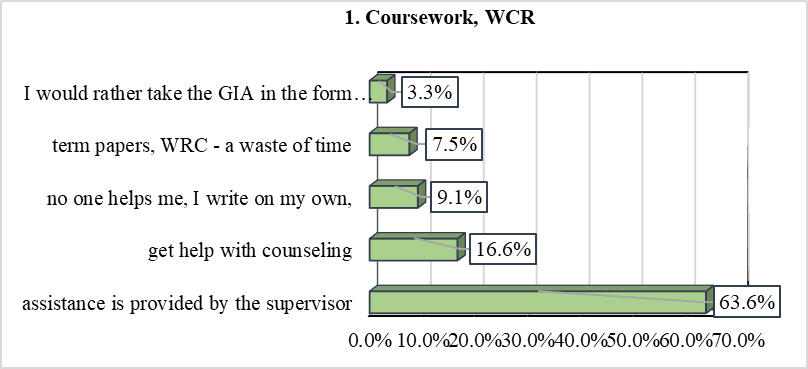
63.6 % of respondents gave a positive answer to the first question of the questionnaire – when writing term papers and final papers, the supervisor provides a lot of help, 9.1 % answered that no one is helping them, and they write on their own; while only 3.3 % prefer the interdisciplinary oral exam. According to the results of the first question, it was revealed that most students receive assistance from a supervisor (Figure 01).
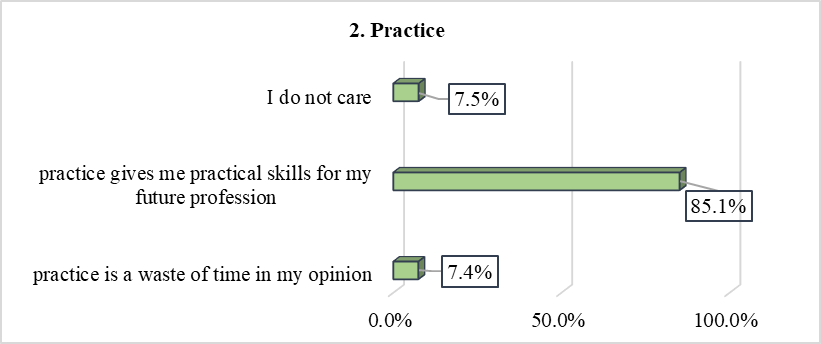
On the second question, 85.1 % of respondents noted that practice gives them the necessary knowledge and skills for their future profession, 14.9 % answered that they do not care and practice is a waste of time. The vast majority of students agree that practical skills can be acquired through practice (Figure 02).
Teachers and leaders of practices need to focus on the correct organization and conduct of practice, with students to conduct explanatory work on the importance of practice in the formation of competencies.
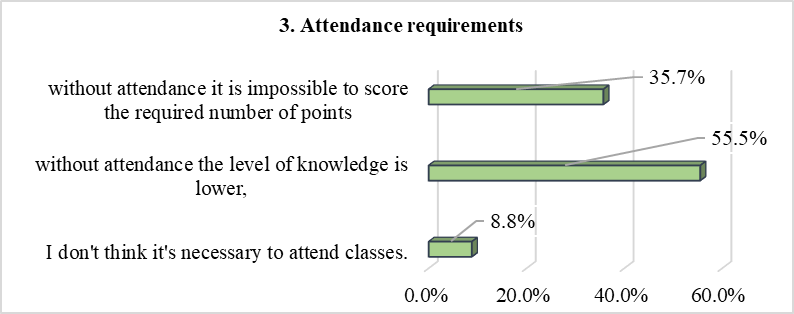
When asked about the importance of attending classes, 55.5 % of the respondents answered that the level of knowledge is lower with permits; 35.7 % believe that without attendance it is impossible to score the required number of points, and 8.8 % believe that it is not necessary to attend classes. The majority of students believe that attendance is important, and therefore agree with the internal regulations of the University in terms of attendance requirements. But a small number believe that the basis of studying at a university should be the principle of not attendance, but knowledge (Figure 3).
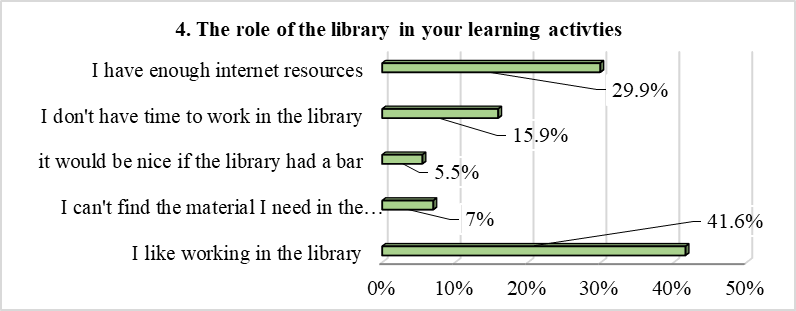
The fourth question about working in the library was “liked” by 41.6 % of respondents, and 36.9 % believe that there are enough Internet resources. It was revealed that 7 % of the library users do not find the required material (Figure 4).
Necessary:
- take into account new digital technologies;
- students contact the library staff for advice on finding the necessary literature in the ELS;
- the head of the department periodically update (apply for new literature) fund of printed publications of the library in accordance with changes in curricula.

The vast majority believes that control motivates and disciplines, however, there are 10.9 % of respondents who believe that control is biased and 13.5 % – control interferes with the educational process. On the question of satisfaction with the system of knowledge control of students, the answers of the respondents were distributed as follows: more than 75 % of students are satisfied with the control system, a tenth of the students believe that the control is biased (Figure 5).
Teachers need to reconsider their attitude to control, since an objective and adequate assessment of the student's activity is one of the main conditions of the Bologna system and the requirements of the Federal State Educational Standard.
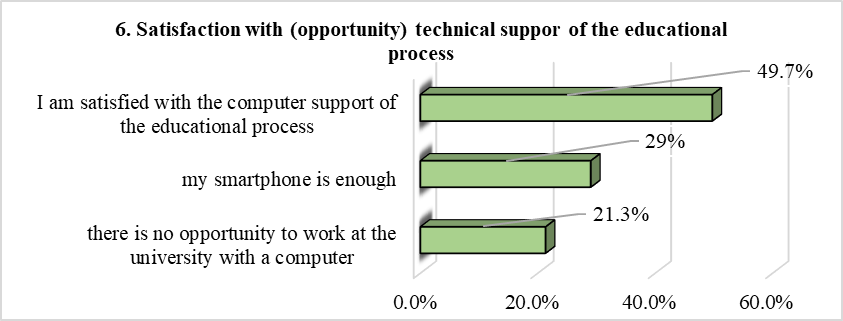
“I am satisfied with the technical support,” 49.7 % of respondents said, and 21.3 % of respondents answered that there is no opportunity to work with a computer at the university. More than 20 % are not satisfied with computer software (Figure 6).
From the analysis of this issue, it follows that it is necessary to consider the issue of monitoring the quality of resource provision. In the era of information technology development and global digitalization, access to computers should be high.
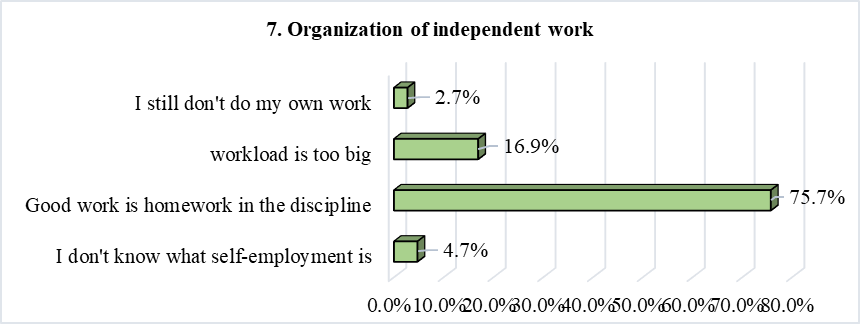
On the seventh question, 75.7 % of respondents believe that independent work is homework in the discipline and 16.9 % answered that the amount of independent work is too large, 2.7 % and 4.7 % do not do it and do not know what is independent work, respectively (Figure 7).
More than 80 % of the respondents do not know the difference between homework and independent work in a discipline (i.e., about the required amount of material in a discipline for the formation of competencies). Teachers are recommended to convey to the student the entire scope of the educational program in the discipline.
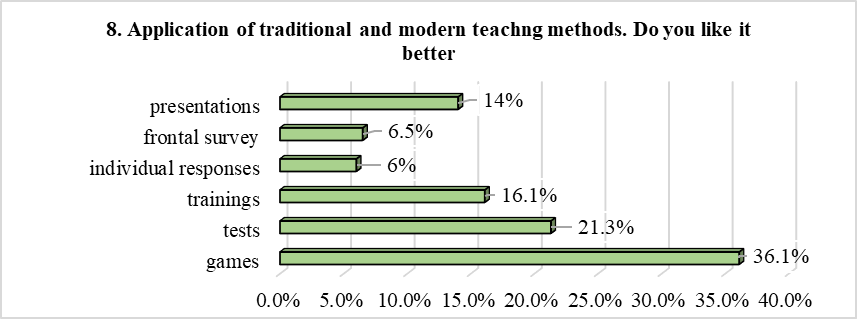
When answering this question, there was a doubt about the small variety of teaching methods used, but still a large number of respondents – 36.1 % chose games as one of the effective teaching methods (Figure 8).
Based on the analysis, the students preferred modern teaching methods. Based on the analysis on this issue, it is necessary to apply a variety of methods of teaching the discipline.

On the ninth question, 52 % of respondents answered that they have a portfolio, 34.9 % believe that it is not necessary, and 13.1 % do not know what it is (Figure 9).
Based on the results of this question, it was revealed that half of the students do not have a portfolio, and they do not know what it is.
It is recommended that all structural divisions take note of this issue, and the informatization department should think about the electronic portfolio of students.
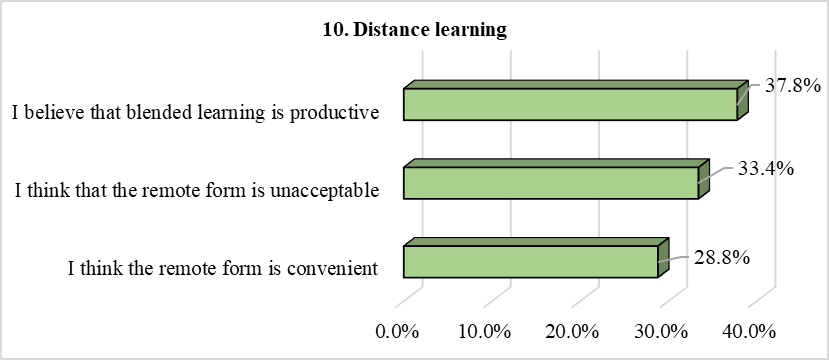
When answering the tenth question, the opinion differed, the majority of respondents – 37.8 % believe that the blended form of education is productive, and a third of the students surveyed (33.4 %) consider the distance form of education to be ineffective and 28.8 % believe that the distance form is convenient (Figure 10).
More than 60% allow distance learning, but a third of students are categorical on this issue and deny distance learning as ineffective in obtaining knowledge.
Conclusion
The final analysis shows that there are issues that require close attention, special control, on which the quality of the functioning of the educational process depends:
1. Organization of independent work.
2. The role of the library in your learning activities.
3. Satisfaction (opportunity) with the technical support of the educational process.
4. Distance learning.
5. Student portfolio.
Conclusions.
1. The average indicator of students' satisfaction with the educational process was revealed – 59 %, which corresponds to the average degree of satisfaction with the educational process according to the given assessment scale.
2. Based on the results of the monitoring, covering students from all structural divisions of the university, a comparative and final analysis of the monitoring results was made and a number of issues were identified that require special attention.
3. Based on the analysis of monitoring results, it is possible to develop proposals for improving the functioning of the educational process at the university, the quality of the educational process in disciplines and making managerial decisions.
Recommendations:
1. All heads of educational programs and heads of the department include the issue of organizing independent work on the agenda of meetings.
2. To the question of the role of the library in educational activities:
- actively promote and apply digital technologies;
- students contact the library staff for advice on finding the necessary literature in the electronic library system;
- the head of the department periodically update (apply for new literature) fund of printed publications of the library in accordance with changes in curricula.
3. Consider the issue of monitoring the quality of resource provision (provision with information and computer technologies).
4. When organizing educational activities, departments should pay special attention to the formation of a culture among the teaching staff in matters of objective control of students and familiarization of students with the structure and volume of the discipline taught in the classroom.
5. Teachers should reconsider their attitude to control, since an objective assessment of the student's activity is one of the main conditions of the Bologna system and the requirements of the Federal State Educational Standard of Higher Education.
6. All structural subdivisions and informatization management include in the agenda of the meetings the issue of the electronic portfolio and its implementation in the automated information system "Tandem".
References
Bagadirova, S. K., Sharova, E. I., & Kudainetov, M. R. (2016). Monitoring the quality of education: a textbook for students under the programs of training scientific and pedagogical personnel in graduate school. Berlin: Direct-Media.
Howie, S., & Plomp, T. (2005). International comparative studies of education and large-scale change. In: V.N. Bashtsia, A. Cummings, A. Datnov, K. Laywood, & D. Livingston (Eds.), International Educational Policy Guide (pp. 75–100). Dordrecht, the Netherlands: Kluwer Press.
Hunter, B., White, G. P., & Godby, G. S. (2006). What does it mean to be globally competent? Journal of Research in Intercultural Education, 10, 267–285.
Izmailova, M. A. (2015). Problems of an independent assessment of the quality of education. Bulletin of the Financial University, 1, 103–111.
Leimu, K., Linnakylä, P., & Välijärvi, J. (1998). Fusion of national and international interests in assessing the educational system. Materials of the conference, held at the University of Jyväskylä, Finland. University of Jyväskylä. Institute for Educational Research (March 19–20).
Nikishina, O. A. (2014). Normative bases for an independent assessment of the quality of education. Bulletin of the Minin University, 2, 22–23.
Raev, K. V. (2018). Toolkit and results of testing a multicomponent model of an independent assessment of the quality of higher education. Bulletin of the University (State University of Management), 5, 181–188.
Razinkina, E. M., Raev, K. V., & Kalinina, O. V. (2019). Internal system for assessing the quality of education: an independent assessment of the professional competencies of teaching staff. Scientific and technical statements of St. Petersburg State University. Humanities and social sciences, 10(2), 112–122.
Solovyova, I. V., & Puchkova, E. E. (2015). New procedures for an independent assessment of the quality of education at a university. Pedagogical skills and pedagogical technologies, (4), 165–170.
Temnov, E. S. (2018). Analysis of technologies for internal independent assessment of the quality of education used in Russian universities. Bulletin of the Tula State University. Pedagogy, 3, 124–132.
Copyright information

This work is licensed under a Creative Commons Attribution-NonCommercial-NoDerivatives 4.0 International License.
About this article
Publication Date
23 December 2022
Article Doi
eBook ISBN
978-1-80296-128-7
Publisher
European Publisher
Volume
129
Print ISBN (optional)
-
Edition Number
1st Edition
Pages
1-1335
Subjects
Science, philosophy, academic community, scientific progress, education, methodology of science, academic communication
Cite this article as:
Eliphanov, S. B., Arsieva, M. A., Dadabaev, O. Z., Omarkhadzhieva, F. S., Gaysumova, L. D., & Kaisarov, M. T. (2022). Methodology For Detecting Level Of Student Satisfaction With Quality Of Educational Process. In D. K. Bataev, S. A. Gapurov, A. D. Osmaev, V. K. Akaev, L. M. Idigova, M. R. Ovhadov, A. R. Salgiriev, & M. M. Betilmerzaeva (Eds.), Knowledge, Man and Civilization- ISCKMC 2022, vol 129. European Proceedings of Social and Behavioural Sciences (pp. 386-394). European Publisher. https://doi.org/10.15405/epsbs.2022.12.49

